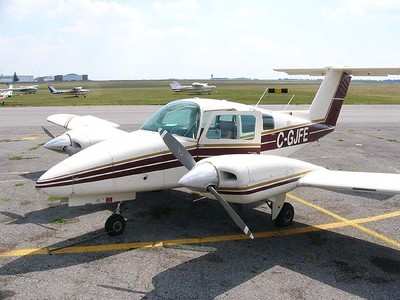Thu, Apr 22, 2021
AD 2021-08-06 Requires Magnetic Particle Inspections Of The MLG “A” Frame Assemblies
The FAA is superseding Airworthiness Directive (AD) 97-06-10 for certain Raytheon Aircraft Company (type certificate now held by Textron Aviation Inc. (Textron)) Model 76 airplanes. AD 97-06-10 required repetitively inspecting the main landing gear (MLG) “A” frame assemblies for cracks and replacing any cracked assembly.

Since the FAA issued AD 97-06-10, the replacement parts have also experienced failure due to cracking. This AD requires magnetic particle inspections of the MLG “A” frame assemblies for cracks and replacement of the affected parts if necessary. The FAA is issuing this AD to address the unsafe condition on these products. This AD is effective May 25, 2021.
Supplementary Information: The FAA issued a notice of proposed rulemaking (NPRM) to amend 14 CFR part 39 to supersede AD 97-06-10, Amendment 39-9967 (62 FR 12949, March 19, 1997) (AD 97-06-10). AD 97-06-10 applied to Raytheon Aircraft Company (type certificate now held by Textron) Model 76 airplanes, serial numbers ME-1 through ME-437 that do not have both a part number (P/N) 105-810023-75 (left) and P/N 105-810023-76 (right) MLG “A” frame assembly installed. The NPRM published in the Federal Register on December 14, 2020 (85 FR 80693).
AD 97-06-10 required repetitive visual and dye penetrant inspections of the MLG “A” frame assemblies for cracks and replacement of any assembly found cracked. AD 97-06-10 did not apply to Model 76 airplanes with an improved design MLG “A” frame assembly (P/N 105-810023-75 and P/N 105-810023-76) installed on both the left and right MLG. The FAA issued AD 97-06-10 to prevent MLG failure because of a cracked “A” frame assembly, which could result in loss of control of the airplane during landing.
The NPRM was prompted by reports of P/N 105-810023-75 and P/N 105-810023-76 “A” frame assemblies failing due to fatigue cracking, resulting in damage to the propeller and outboard wing area. The FAA determined that the visual and dye penetrant inspections were not adequately detecting cracks in the MLG “A” frame assemblies, because some of the failed parts had been subjected to visual and dye penetrant inspections within 100 hours before the failure.
In the NPRM, the FAA proposed to require repetitive magnetic particle inspections, which provide quicker results (after testing setup) with improved accuracy. Also, the NPRM reflected that the type certificate for the Model 76 airplane had been transferred from Raytheon to Textron, and that Textron designed new replacement parts, P/Ns 105-810023-0083 (left) and 105-810023-0084 (right), that were not subject to the proposed repetitive magnetic particle inspections. However, the newly designed MLG assemblies are still subject to the repetitive inspections specified in the maintenance manual.
More News
“Sport Pilot 2.0 gives more people than ever the opening to pursue their dreams of putting themselves in the pilot seat and enjoying the unique perspectives of flight. This v>[...]
WindBorne’s CEO Cooperating In Investigation Of Mysterious Incident After a mysterious collision with what was thought to be either an asteroid or space debris, it’s lo>[...]
Man Arrested After Attempting to Bring an Assault Rifle Into the World’s Busiest Airport A 49-year-old man was arrested by Atlanta police officers for allegedly planning a ma>[...]
Senate Commerce Committee Passes Cruz’s ROTOR Act The Rotorcraft Operations Transparency and Oversight Reform (ROTOR) Act, introduced by Chairman Ted Cruz and Ranking Member >[...]
ROTOR Act Closes Loopholes And Mandate Safety Technology The Air Line Pilots Association, Int’l, issued a statement lauding a bipartisan bill introduced by Senators Ted Cruz >[...]
 Aero-News: Quote of the Day (10.23.25)
Aero-News: Quote of the Day (10.23.25) United Airliner Likely Hit Weather Balloon, Not Space Object
United Airliner Likely Hit Weather Balloon, Not Space Object Atlanta Cops Block Attempted Shooting at Hartsfield-Jackson
Atlanta Cops Block Attempted Shooting at Hartsfield-Jackson Aviation Tracking Technology Bill Flies Through the Senate
Aviation Tracking Technology Bill Flies Through the Senate ALPA Praises Bipartisan Bill To Mitigate Helicopter Risks
ALPA Praises Bipartisan Bill To Mitigate Helicopter Risks



